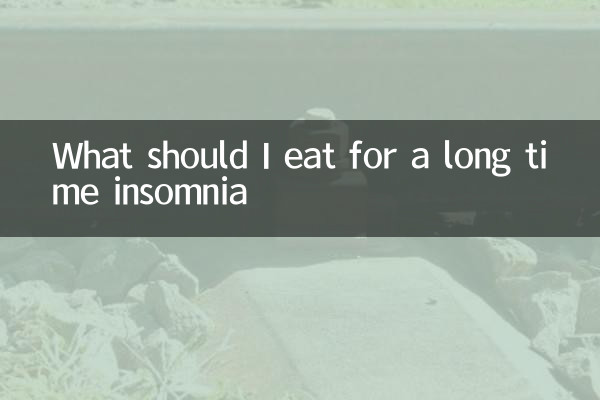What should I eat for long-term insomnia? ——10-day hot topics and scientific suggestions on the entire network
In the past 10 days, topics about insomnia and dietary conditioning have continued to ferment on social media and health forums. According to data analysis across the network, long-term insomnia has become a common health issue for modern people, and the method of improving sleep quality through diet has attracted much attention. This article will combine the latest hot topics and scientific basis to provide you with structured solutions.
1. Statistics on hot topics related to insomnia in the past 10 days on the entire network

| Ranking | Hot Topics | Discussion volume (10,000) | Main Platforms |
|---|---|---|---|
| 1 | Is melatonin really safe? | 28.5 | Weibo/Zhihu |
| 2 | Sleep-aiding food rankings | 22.1 | Xiaohongshu/B station |
| 3 | Relationship between insomnia and intestinal flora | 18.7 | WeChat official account |
| 4 | Traditional Chinese medicine diet therapy for insomnia | 15.3 | TikTok/Quick Shou |
| 5 | Caffeine-sensitive constitution test | 12.9 | Weibo/Douban |
2. Scientifically verified recommendations for sleep-aided food classification
According to the latest guidelines of the China Sleep Research Association and the popularity of discussions across the Internet, the following foods have been proven to have a positive effect on improving sleep:
| Food Categories | Representative food | Sleep-aiding ingredients | Best time to eat |
|---|---|---|---|
| Rich in tryptophan | Milk, banana, millet | Tryptophan (serotonin precursor) | 1 hour before dinner or bedtime |
| High-magnesium foods | Almonds, spinach, dark chocolate | Magnesium (Neurosedative) | Can be consumed in batches throughout the day |
| Contains melatonin | Cherries, walnuts, oats | Natural melatonin | 2 hours before bed |
| B vitamins | Whole grains, eggs, lean meat | B6/B12 (regulating nerves) | Lunch and dinner |
| Probiotic food | Yogurt, kimchi, kombucha | Probiotics (Intestinal brain regulation) | After meals or extra meals |
3. The recent popularity of traditional Chinese medicine diet therapy prescriptions
Recently, the following traditional diet therapy recipes have received millions of likes and collections on Douyin and Xiaohongshu platforms:
| Name of dietary therapy | Main materials | How to make | Applicable groups |
|---|---|---|---|
| Anshen Millet Porridge | Millet, red dates, lilies | Slow heat for 40 minutes | Insomnia with both heart and spleen deficiency |
| Sour jujube seed tea | Jujube seeds, Poria cocos, licorice | Brew in boiling water for 15 minutes | Anxiety Insomnia |
| Longan Lotus Seed Soup | Longan, lotus seeds, wolfberry | Steam for 1 hour in water | Insomnia insufficient qi and blood |
| Mulberry Honey Drink | Fresh mulberries and honey | Blend after juice | Liver and kidney yin deficiency type insomnia |
4. Dietary misunderstandings that need to be avoided
According to the recent voting survey initiated by nutritionists on Weibo, the following common misunderstandings need special attention:
1.Over-dependence on melatonin supplements- Recent hot searches #Melatonin side effects# topic shows that long-term use may affect one's own secretion function
2.Drinking alcohol before bed helps sleep- Although you can fall asleep quickly, it will significantly reduce the quality of sleep, which has become the focus of discussion on Zhihu hot posts
3.No carbohydrates at all- Low-carbon diet may affect tryptophan absorption, it is recommended to choose high-quality carbohydrates such as whole grains
4.Drink plenty of water at night- May cause frequent urination at night, it is recommended to control the amount of water 2 hours before going to bed
5. Personalized dietary advice
Combined with hot discussion content and professional suggestions across the network, different types of insomnia can focus on different dietary plans:
1. Difficulty falling asleep:Add foods rich in magnesium and tryptophan, and dinner with whole grains such as millet
2. Light sleep easily wake up:Supplement of Omega-3 fatty acids (deep sea fish, flax seeds) and B vitamins
3. Early awakening type:Increase compound carbohydrates in moderation to avoid afternoon caffeine intake
4. Dreamy type:Supplement calcium and vitamin D, and eat potassium-containing foods such as bananas appropriately
The recent "Sleep Nutrition" series of videos that have been popular on Bilibili emphasize that establishing a regular diet rhythm is more important than simply eating a certain food. It is recommended to have three meals in a fixed time, and it is better to have enough dinner or hungry. Supplying a small amount of carbohydrates before going to bed is more beneficial to sleep.
Finally, it is reminded that if long-term insomnia seriously affects the quality of life, you should seek medical treatment in a timely manner to check for potential diseases. Dietary conditioning can be used as an auxiliary means, but it cannot completely replace medical treatment.

check the details

check the details